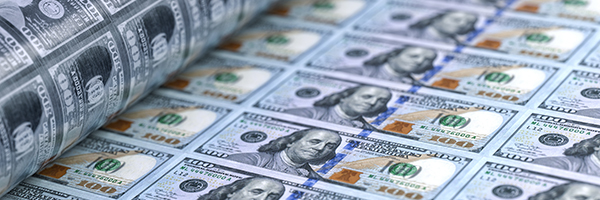
June 15, 2021 | Daily JAM, Morning Briefing |
Retail sales fell by 1.3% in May from April, the Commerce Department reported this morning. Economists surveyed by Bloomberg had projected a 0.8% month over month drop. The month to month drop in retail sales was the first drop in month to month sales since February. Retail sales still grew a very solid 23% year over year as the economy continued its recovery from the pandemic recession of 2020.

June 14, 2021 | Daily JAM |
After a quick jump in bond prices (and decline in yields) forced Treasury short-sellers to buy in order to cover their trade (and avoid further losses), today, Monday June 4, Wall Street strategists are saying that in the short-term the pendulum has swung back too far and it’s now time to go short Treasuries again ahead of Wednesday’s meeting of the Federal Reserve.

June 14, 2021 | Daily JAM, Morning Briefing, Short Term |
As of the close on Monday, June 4, the major stock indexes were treading water waiting to here what, if anything, the Federal Reserve might say after the Wednesday meeting of its interest-rate-setting body, the Open Market Committee. (No one really expects the Fed to actually do anything about the monthly schedule for bond purchases or about changing the benchmark interest rate now set at 0% to 0.25%.) The Standard & Poor’s 500 was up 0.18% but the Dow Jones Industrial Average was off 0.25%. The NASDAQ Composite was up 0.74% but the small cap Russell 2000 was lower by 0.54%.

June 11, 2021 | Daily JAM, Morning Briefing |
Yesterday the Standard & Poor’s 500 hit its first new all-time high since early May as investors and traders bought into the reassurance from the Federal Reserve that the 5% year over year increase in the Consumer Price Index was merely a temporary jump in inflation. Today, with the weekend immediately ahead and the June 16 meeting of the Fed’s interest-rate setting Open Market Committee looming on Wednesday, June 16, nobody wanted to get much further ahead of actual news from the central bank.

June 9, 2021 | Daily JAM |
The Federal Reserve’s Revere Repurchase Facility, the way for banks to park short-term money with the Fed overnight, keeps attracting more and more cash from banks. Even though the Fed ways 0% interest. As of June 8 banks were placing $497.4 billion–roughly half a trillion–with the Fed overnight.
The amount parked with the Fed has been growing too. And the total parked each night with the Fed could hit $1 trillion by the end of the second quarter of 2021, according to the Bank Policy Institute

June 7, 2021 | Daily JAM, Volatility |
The CBOE S&P Volatility Index (VIX) dropped 8.9% on Friday, June 4, to 16.44. It’ up just slightly today to 16.73 (up 1.89%) as of 2 p.m. New York time. That’s, in my opinion, an extremely low reading on the fear index considering how many potentially market moving volatility events we’ve got ahead of us over the next six months. (For a list see my Special Report: 5 picks and 5 hedges for a falling market.) So today, June 7, I’m adding another Call Option on the ViX to my Volatility Portfolio.

June 6, 2021 | Daily JAM |
I expect Treasury Secretary Janet Yellen’s 3% inflation in 2021 comment to keep the market in a relatively tight trading range this week as we approach the June 16 meeting of the Federal Reserve’s rate-setting body, the Open Market Committee. After the end of the meeting of G7 finance ministers, Yellen noted that the Biden administration’s spending plans plus an anticipated recovery from the depths of the pandemic recession could produce an inflation rate of 3% in 2021 That would be above the 2% inflation target at the Fed. The Federal Reserve’s current inflation stance is that a “temporary” increase in inflation to above that 2% target would be okay since it would help balance out years of sub-2% inflation and since it would be temporary. Yellen’s take on a potential 3% rate is in line with the Fed’s approach. The rise in inflation will be temporary and its a result of a rebound from falling prices during the pandemic recession in 2020 (and severe glitches in the supply chain for everything from computer chips to oat like to tin.)The two big questions for the next 10 days are 1. Will the financial markets continue to believe the Fed/Yellen “it’s temporary” take on inflation? 2. Will the Fed change its language on inflation and its projections for inflation at the June 16 meeting, which is due to produce an update of the Fed’s projections on things like GDP growth, employment, and inflation?

May 31, 2021 | Daily JAM, Mid Term, Morning Briefing, Special Reports |
Today’s installment includes one hedge (on the ViX) and one stock pick (Lam Research.) Now if you’ve been following along with the logic that I’ve laid out in this Special Report, you know that stocks face months of potential volatility around the Fed’s June 16 meeting (What will the Fed say about ending its $120 billion in monthly bond purchases?), the August global central bankers confab in Jackson Hole (Will the Fed use the occasion, as it has done in the past, to indicate a coming change in interest rate policy?), the Fed’s September 22 meeting (Will the Fed be content to say nothing with the next “important” meeting not until December?) and then the central bank’s December 15 meeting.) That’s a large number of occasions that could set the stock market to worrying again. And then, of course, there’s OPEC and the price of oil, the battle over the recently announced Biden budget, the continued logjam on infrastructure spending, and fact that the pandemic is still running at full speed in countries such as India (and who knows what the return of cold weather and forced winter “togetherness” will do to infection rates in the developed economies of the northern hemisphere.) At 16.74 on the VIX, you don’t need a panic to produce a profit on higher volatility. The VIX was at 22.18 on May 19. And then there are the even higher VIX levels of 27.59 on May 12, 28.57 on Marcy 4, and 28.89 on February 25.
May 19, 2021 | Daily JAM |
The Wall Street adage “Sell in May and go away” looks to be spot on this year. At the close yesterday on May 18, the Invesco QQQ Trust ETF (QQQ), which tracks the NASDAQ 100, was still p 2.83% for 2021, but down 2.96% for the last three months and off 5.79% for the last month. But the full saying in its original form runs “Sell in May and go away; Don’t come back until St. Leger’s Day.” St. Leger’s Day marked the running of the third race in the British Triple Crown, which took place in September. The advice was to sell ahead of the quiet summer London social season. The adage as I learned it (not in England between the wars, mind you, since I’m not either that old or that patrician) advised to “Buy on NEA,” the big technology and venture capital conference usually held in November. That seasonal timing strategy let investors reap the gains from, historically, the six best months of the yer (November through April) and avoid the sluggish performance of May through October. From 1950 through 2019 the November through April period of each year saw the Standard & Poor’s 500 gain 2283.7 points, according to calculations by Jeffrey Hirsch in the Stock Trader’s Almanach. That’s against gains of just 610.79 points in the worst six months during that period. But this year? When should an investor or trader who has sold in May think about coming back?

May 19, 2021 | Daily JAM, Morning Briefing |
The minutes from the Federal Reserve’s April 28 meeting show officials at the central bank edging toward talking about when to cut bond buying and raise interest rates. Fed members said they need to see “substantial” further progress toward their goals of inflation that averages 2% and a full recovery in the labor market before slowing down $120 billion in monthly bond purchases. That’s language that the Fed had used before and has used since the meeting.

May 12, 2021 | Daily JAM |
Today, May 13, investors and traders sold everything on the surprisingly strong April inflation report. This kind of sell everything reaction is typical of this first stage in a big market shift in sentiment. The question now is How long does this stage last? And When does the buying of winners in this new scenario kick in (along with continued but less violent selling of the losers?)

May 12, 2021 | Daily JAM, Morning Briefing |
Consumer prices, as measured by the Consumer Price Index (CPI) soared in April. For the month prices in the all-item index gained 0.8% for a 12-month increase of 4.2%. The core CPI, which excludes volatile prices in the food and energy sectors, was up 0.9% in April and is now up 3.0% over the last 12 months. But what’s it all mean?











